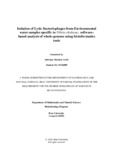Isolation of Lytic Bacteriophages from Environmental water samples specific to Vibrio cholerae; software-based analysis of whole-genome using bioinformatics tools

View/Open
Date
2020-08Publisher
Brac UniversityAuthor
Arthi, Safwana MurshedMetadata
Show full item recordAbstract
Vibrio cholerae is an opportunistic, gram-negative bacterium that is commonly found in fresh and saltwater, soil, food, or in the intestine of humans and animals. It is the most causative agent of cholera; a chronic diarrheal disease with epidemic and pandemic potentials that might lead to death if untreated. Cholera has been recognized as a significant public health problem around the world and already faced seven cholera pandemics. Lytic bacteriophages specific to V. cholerae are the most potent triggers of causing cholera outbreaks by killing bacteria present in the infected individuals and environmental reservoir. This study includes molecular isolation of bacteriophage DNA from the environmental water samples and bioinformatics software analysis as well. However, a very unique bacteriophage (WT1774), was isolated from this study which showed the least similarities among other phages. Although the whole genome sequencing might not be done properly, all relevant computational analyses (including genomic and phenotypic characteristics) couldn’t be performed as expected. To retrieve all essential information for higher research, further analysis is needed.
